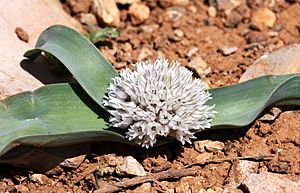Lebanese garlic facts for kids
Quick facts for kids Lebanese garlic |
|
|---|---|
 |
|
| Conservation status | |
| Scientific classification | |
| Genus: |
Allium
|
| Species: |
libani
|
Allium libani, also known as Lebanese garlic (ثوم لبناني), is a type of wild plant that grows from a bulb. It belongs to the Allium genus, which includes onions, garlic, and chives. This special plant is found only in the Middle East, specifically in Lebanon and Syria.
Contents
What is Lebanese Garlic?
Lebanese garlic is a unique plant that grows from a bulb, similar to how a tulip or daffodil grows. It's known as a "geophyte," which means it has a part that stays underground, like a bulb, to survive tough conditions. This plant is part of the Amaryllidaceae family, which also includes many beautiful flowering plants.
How Was it Named?
The scientific name Allium libani was first described by a botanist named Pierre Edmond Boissier. He published his findings in 1854.
The name Allium comes from an old word that Romans and Greeks used for garlic-like plants. Some people think it comes from a Celtic word meaning "to burn," because of the strong smell of garlic. The second part of the name, libani, simply tells us where the plant is found: in Lebanon.
What Does it Look Like?
Lebanese garlic is a plant that loses its leaves every year. Its leaves are simple and grow from the base of the plant. They are wide and linear, meaning they are long and narrow with smooth edges.
Unlike many plants in its family, Allium libani doesn't have a tall stem (called a scape). This makes its flowers appear to grow right at ground level. The flowers of Allium libani are white. After the flowers, the plant produces fruits that are small capsules, which split open to release seeds.
Where Does it Grow Best?
These plants like sunny spots. They prefer soil that is dry to somewhat moist. The best types of soil for them are sandy-loamy, gritty-loamy, or sandy clay. Lebanese garlic can handle cold temperatures, even down to about -7 degrees Celsius (19 degrees Fahrenheit).
See also
 In Spanish: Allium libani para niños
In Spanish: Allium libani para niños
 | Tommie Smith |
 | Simone Manuel |
 | Shani Davis |
 | Simone Biles |
 | Alice Coachman |


